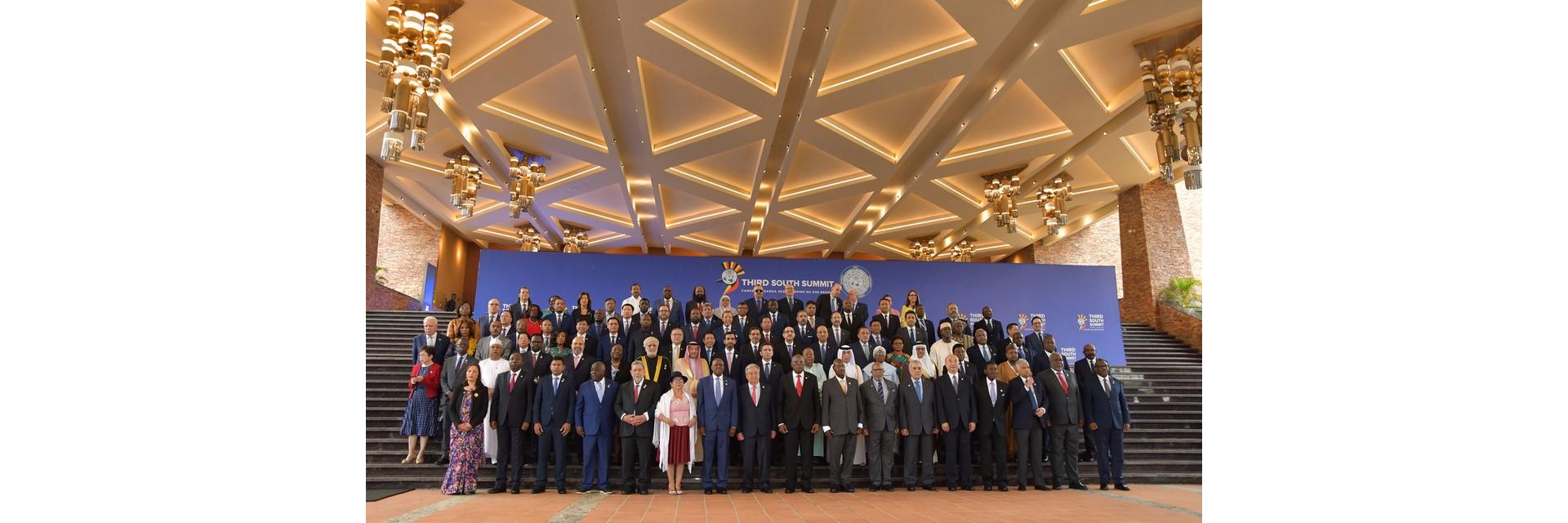Kampala, Uganda, 22 January 2024 (ECA)- The Group of 77 countries plus China is an important platform for developing countries to make their collective voices heard at a time when the world is facing multiple crises, said Claver Gatete, Executive Secretary of the Economic Commission for Africa (ECA). This, he said, is the key principle of ‘Leaving No One Behind’ that must guide our actions.
Mr Gatete was speaking on behalf of the five UN Regional Economic Commissions at the Third South Summit in Kampala, Uganda that took place on the theme: Leaving no one behind. The Summit was aimed at “bringing a new dynamic to the cooperation among its 134 member States of the Group of 77 (G-77) in a more competitive world.”
“As we prepare for the Summit of the Future, the unified voice of the G77 plus China will be a critical factor for success. The convening role of the regional commissions will also be essential,” said Mr Gatete adding that the principle of “leave no one behind” is more than the North-South divide. It is about the most basic and fundamental right and dignity of our people.
“If there was ever a time when multilateralism demanded more from us, now is the time, and the leadership role of the G77 plus China will become even more critical.
The ECA executive secretary noted that the regional commissions, established by resolutions of the Economic and Social Council to promote regional development remain committed to the spirit of partnership across the global divide, “as we work together to leave no one behind.”
There are five regional commissions: ECA: Economic Commission for Africa; ECE: Economic Commission for Europe; ECLAC: Economic Commission for Latin America and the Caribbean; ESCAP: Economic and Social Commission for Asia and the Pacific and ESCWA: Economic and Social Commission for Western Asia.
He highlighted three key areas illustrating the regional commissions’ role in contributing to the principle of Leaving No one Behind and assessing the sources of vulnerabilities in developing countries.
One is the deficit of industrialisation which prevents the creation of decent jobs to tackle poverty adequately. “Many developing countries, especially in Africa, still export primary commodities and import manufactured goods, leading to significant external deficits, high debt levels and narrow fiscal space for basic social needs,” he said.
The second is the exposure to the negative effects of climate change. “It is ironic that those in the global south who contribute the least suffer the worst consequences. And the global response falls short, leading to protectionist policies,” he stressed.
The third is the deficit in technological development that could lead to further global divide.
He recognized the efforts of all the regional commissions in working together to advance the global discussions on loss and damage that led to the pledge of more than US$ 700 million to the loss and damage fund.
“ECA has been working to strengthen the capacities of our member states to establish carbon credit markets. It does not make sense for African countries to earn less than US$10 per ton of carbon whilst countries in Europe earn over US$100,” said Mr Gatete.
ECA has also been working jointly with the African Union and member countries, during the first ever Africa Climate Summit hosted by the Republic of Kenya. We were able to determine the priorities and actions needed to help the continent address pressing climate needs.
Furthermore, in the principle of leaving no one behind, the Blue Economy Conference convened by the President of Comoros, as Chairperson of the African Union, with ECA’s support, put the peculiar challenges faced by Island and Coastal States at the forefront of the discourse.
“We are supporting the implementation of the great Blue Wall initiative in the western part of the Indian ocean that will lead to income generating opportunities for more than 70 million people,” noted Mr Gatete.
He also highlighted ongoing support to the implementation of the Africa Continental Free Trade Area agreement and the African Union Digital Transformation Strategy for Africa (2020–2030), as master plans for transforming the continent, as well as ongoing work with member States on a common Africa voice on the Global Digital Compact.
Issued by:
Communications Section
Economic Commission for Africa
PO Box 3001
Addis Ababa
Ethiopia
Tel: +251 11 551 5826
E-mail: eca-info@un.org

